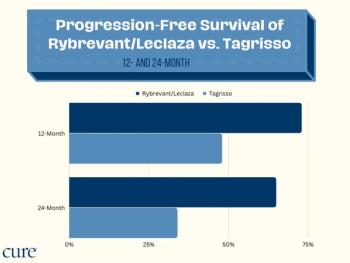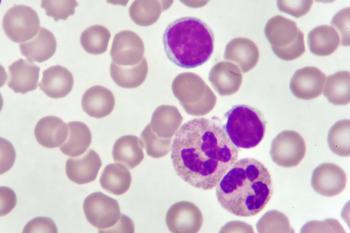
Tukysa added to Herceptin and Perjeta improved progression-free survival versus placebo in HER2-positive metastatic breast cancer after initial therapy.

Tukysa added to Herceptin and Perjeta improved progression-free survival versus placebo in HER2-positive metastatic breast cancer after initial therapy.

Lenvima and Keytruda with chemo did not help patients with metastatic esophageal squamous cell carcinoma live longer than Keytruda and chemotherapy alone.

Patients with advanced, pretreated ROS1-positive NSCLC treated with zidesamtinib saw an objective response rate of 44%.

Camizestrant and continued therapy with CDK4/6 inhibition benefits patients who present with ESR1-mutated, ER+, HER2– advanced breast cancer.

Among patients with ESR1-mutant, ER+, HER2– advanced breast cancer, vepdegestrant improved survival without progression when compared with Faslodex.

Itovebi plus Ibrance and Faslodex improved overall survival in patients with PIK3CA-mutant, HR+, HER2–, endocrine-resistant breast cancer versus placebo.

Frontline treatment with Tevimbra plus irinotecan, paclitaxel, oxaliplatin and 5-FU/leucovorin had promising efficacy and manageable safety in gastric/GEJ cancer.

Monjuvi plus Revlimid and Rituxan demonstrated improved progression-free survival for patients with relapsed or refractory follicular lymphoma.

Data from the phase 3 DESTINY-Breast06 trial were presented during the 2024 San Antonio Breast Cancer Symposium.

The anti-TIGIT therapy, vibostolimab, plus Keytruda and chemotherapy did not improve overall survival versus Tecentriq plus chemotherapy in extensive-stage small cell lung cancer.

Treatment with Cyramza plus Lonsurf did not improve overall survival compared with Lonsurf alone in heavily pretreated metastatic colorectal cancer.

Among patients with previously treated advanced clear cell renal cell carcinoma (RCC) Welireg continued to show some benefits, though not to overall survival.

Some patients with non-small cell lung cancer saw a 49% reduction in the risk of disease progression or death with ivonescimab versus Keytruda.

Patients with previously untreated locally advanced or metastatic urothelial carcinoma experienced favorable progression-free survival, overall survival and objective response rates when treated with Padcev and Keytruda versus chemotherapy.

Adding Imfinzi and Avastin to transarterial chemoembolization led to a 23% reduction in the risk of progression or death in patients with liver cancer.

Treatment with an all-oral regimen led to three-year overall survival and relapse-free survival rates of 97% in patients with acute promyelocytic leukemia, a subset of acute myeloid leukemia.

Opdivo and non–anthracycline containing chemotherapy before surgery produced promising pathologic complete response rates regardless of whether Opdivo was administered before or during treatment with carboplatin and paclitaxel in patients with stage 1 to 2B triple-negative breast cancer.

While CAR-T cell therapy is showing promise in treating patients with advanced renal cell carcinoma, there is still more research that needs to be done in this arena.

Patients with metastatic or recurrent head and neck squamous cell carcinoma had durable antitumor activity, according to findings from a phase 2 trial.

Patients with advanced non-small cell lung cancer with an EGFR mutation had a greater risk reduction for disease progression with frontline Rybrevant plus Leclaza compared with Tagrisso alone.

A 30% reduction in the risk of death versus. investigator’s choice of chemotherapy as second or third line therapy was concluded when Tivdak was combined for the treatment of recurrent or metastatic cervical cancer with disease progression on doublet chemotherapy.

The treatment combination of Rybrevant plus chemotherapy offers better progression-free survival for patients with advanced EGFR exon 20 insertion-positive NSCLC.

Elderly patients with acute myeloid leukemia did not experience a difference in relapse-free survival or non-relapse mortality with intensive versus non-intensive chemotherapy.

Immunotherapy combinations tended to improve outcomes for patients with metastatic kidney cancer who go on to receive surgery.

There was no major difference in progression-free survival between patients with relapsed/refractory chronic lymphocytic leukemia who were treated with Calquence or Brukinsa.

The addition of Tecentriq to platinum-based chemotherapy/gemcitabine did not boost outcomes in patients with metastatic bladder cancer, according to results from the IMvigor 140 trial.

Patients who underwent Revlimid, Velcade, and dexamethasone therapy followed by maintenance Revlimid, tended to have better outcomes when they underwent autologous stem cell transplant.

The investigational agent SOT101 was safe and tolerable when given alone and in combination with Keytruda for patients with solid tumors.

Adcetris plus doxorubicin, vinblastine and dacarbazine is the first regimen to improve overall survival compared to the current standard of care for patients with advanced-stage classical Hodgkin lymphoma.

Compared with Yervoy alone, the use of Yervoy plus Opdivo was associated with a significant survival benefit as a second-line treatment in patients with previously treated advanced melanoma, a type of skin cancer.

Published: June 6th 2022 | Updated:

Published: May 21st 2021 | Updated:

Published: December 12th 2020 | Updated:

Published: July 31st 2021 | Updated:

Published: July 15th 2023 | Updated:

Published: May 31st 2018 | Updated: